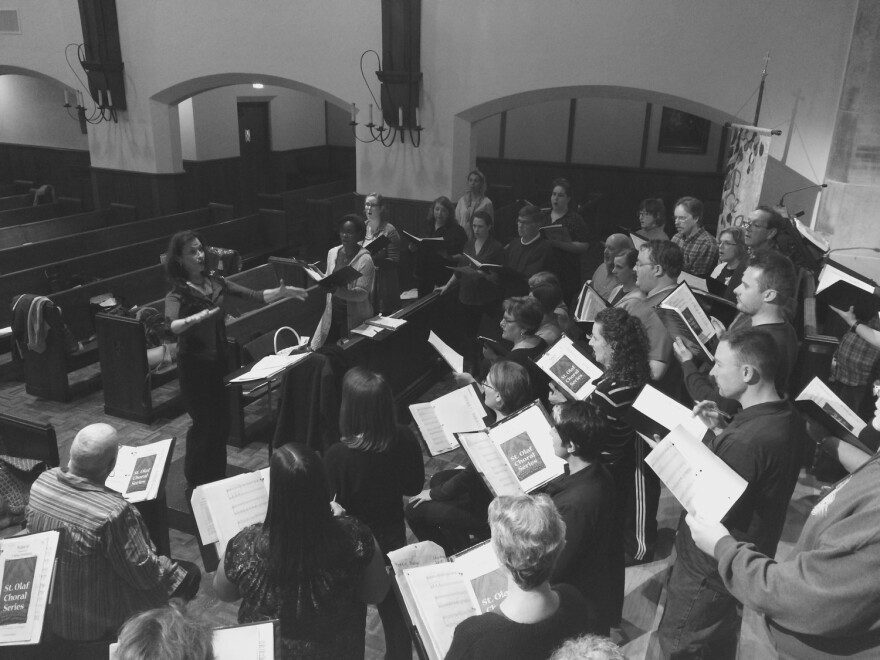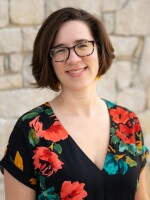“It could be said that Kansas City is blessed with as many fountains like Rome, many boulevards like Paris and many composers like Vienna,” says William Baker, the founder and director of his namesake William Baker Festival Singers.
Audiences get a chance to hear just a few of the pieces by those notable area composers, some living and some long gone, when Baker’s ensemble presents a Festival of Kansas City Composers this weekend.
“We could do one of these programs once a month for the next twenty years and not scratch the surface of the genius of musical creativity in this city,” Baker says. “It is incredible. And it’s not just what’s happening now — it’s what’s been happening for well over 100 years.”
Baker, who also heads The Choral Foundation (which supports ten choirs in three states), grew up in Atlanta, Georgia, and sang and studied with the late, legendary Robert Shaw. Baker formed a group there in 1985 and, when he moved to Kansas City, established The William Baker Festival Singers here in 1998.
This weekend’s concert features a hyper-local focus, with a majority of the works from current and former members of the Festival Singers.
On the program are four pieces from composer-in-residence Ed Frazier Davis, including the world premier of “My Beloved Spoke,” sung in English and Hebrew, the text taken from the Biblical Song of Solomon.
“I really was quite mesmerized when I heard Ed’s music,” Baker says of Davis, who has been with the group since the summer of 2016. (Baker met him through mutual friends and after examining some manuscripts, offered Davis the position on the spot, without even planning on having a composer-in-residence that season.)
Davis’ work is “so creatively and so brilliantly and so vividly made,” Baker says that it generates “an intimacy with music that is deeply moving.”
As the singers prepare, he says, they examine the music’s expressive and the text’s spiritual content, making “those explorations come to life, not only for those who are performing but for those who are hearing it in the audience.”
For his part, Davis says because the Festival Singers are so expressive, he likes to test their abilities “with some admittedly not-so-easy stuff.”
The program also includes work from Sean Sweeden and former composer-in-residence R. Douglas Helvering, along with the world premiere of Vince Gover setting of “Ave Verum Corpus,” composed specifically for the concert.

Many of the works include Biblical text, are traditionally sacred, or serve a purpose in the church calendar. The sacred nature of the works allows not only the audience and chorus to reflect, but also to question and examine, striving to authentically create each composer’s vision.
Like most people, Baker says, composers “struggle with questions of time and eternity and come to different conclusions and struggles at different times in their lives.”
Being unaffiliated with a church or a university, Baker says, allows the Festival Singers to “explore all those questions openly as the music and the preparations for the performance lead us.”
Perhaps the best answers to those questions of time and eternity come in the form of African-American spirituals, which, Baker says, “are some of the finest music that has been created on the face of this earth, that deserves to be done with scholarship and love and affection and understanding, because it says things in ways that nothing else says it.”
That’s why the program includes an arrangement of “Hail Mary” by William Dawson. Originally from Alabama, Dawson came to Kansas City to study at the Horner Institute of Fine Arts (precursor to University of Missouri-Kansas City’s Conservatory of Music and Dance). He graduated in 1923 and taught in the Kansas City public school system before working in Chicago and then moving to the Tuskegee Institute in Alabama, collecting and arranging African-American spirituals for choirs. “Dawson’s settings of spirituals are well-known and well-loved,” says Baker.
Though the chorus usually performs works from the Western canon, spanning repertoire over the last 1,500 years, this departure is a welcome opportunity to work with Kansas City’s creative spirit and heritage.
It’s also an opportunity to share music that is, in many instances, new to the chorus, inviting the audience, as witness, into the process of creation.
“With all the strife and coarseness in the world right now, when we sing in a group, like the Festival Singers, when we hear, like the audience, and when we are a part of the birth of creation, by doing the music of the composers who are in our midst and in our community, then we are part of the work of loving and creating,” says Baker.
Two other choruses join the Festival Singers for this showcase.
The Heritage Choir from Mid-America Nazarene University and Allegro Con Moto, an ensemble of young women in middle and high school, also selected works by Kansas City composers, including Virgil Thomson, Christy Elsner, John Leavitt, Jake Narverud, Andrea Ramsey, and Geoff Wilcken, and join with the Festival Singers in a mass choir for Davis’ setting of the American hymn, “How Can I Keep From Singing.”
Festival of Kansas City Composers, 3 p.m. Sunday, January 28 at St. Mary’s Episcopal Church, 1307 Holmes Road, Kansas City, Missouri.
KCUR contributor Libby Hanssen writes the culture blog Proust Eats A Sandwich. Follow her on Twitter, @libbyhanssen.



